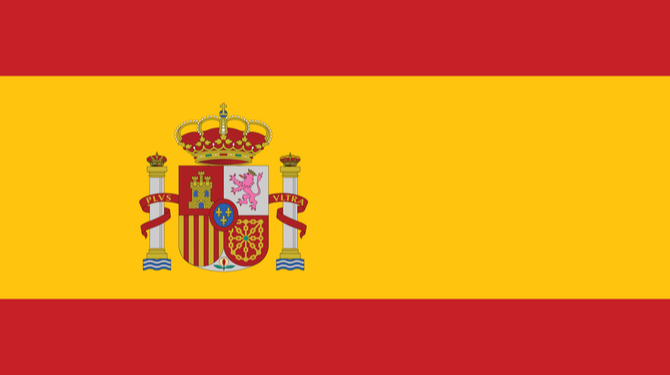
Spain
Anti-counterfeiting
This is the first edition of the Law Over Borders Anti-counterfeiting guide. The second edition is now available for viewing and purchase: Anti-counterfeiting
Introduction
The relevant intellectual property laws and regulations which assist in protecting and enforcing intellectual property rights and anti-counterfeiting measures in Spain are:
- Intellectual Property Law (1/1996).
- Trademarks Law (17/2001) (TM Act).
- Industrial Designs Law (20/2003).
- Patents Law (24/2015).
There have not been any recent developments, but it is worth mentioning that, pursuant to the TM Directive (see Section 1. Criminal Prosecution & Civil Enforcement: Civil enforcement), a recent amendment of the national TM Act has granted the Spanish Patent and Trademark Office (SPTO) jurisdiction over revocation and invalidity proceedings of Spanish trademarks. Such amendment will enter into force on 14 January 2023. As from that date, all invalidity and revocation proceedings will have to be brought before the SPTO, but the National Courts will retain jurisdiction over invalidity and revocation actions exercised as counterclaims in infringement proceedings or directly accumulated in conjunction with an infringement trademarks or design action.
1 . Criminal prosecution & civil enforcement
1.1. Criminal prosecution
Criminal proceedings in Spain are mainly divided into the following phases:
1. First instance:
- pre-trial phase (investigation of the case and collection of evidence);
- intermediate phase (preparation and discussion on the initiation of the oral trial phase);
- trial phase (examination of the evidence produced in the oral trial and the decision on the merits).
2. Second instance:
- appeal; and (if applicable)
- the enforcement phase (compliance with the decision on the merits).
The duration of the pre-trial phase varies, depending mainly on the proactivity of Judges, Public Prosecutors and counsels, as well as the other legal operators involved. The average duration of the pre-trial phase of a case of standard complexity is usually between 2 and 3 years. The course of the remaining phases of the proceedings may vary depending on backlog of the corresponding Court but it usually takes (at least) 1 more year.
Criminal actions in Spain are mostly reserved for cases where the bad faith element is clear and unquestionable, usually associated with counterfeits. The concept of bad faith, from a criminal perspective, is more linked with a clear knowledge of an illicit behaviour.
Spanish criminal law punishes the manufacture, production and importation of counterfeit goods at all levels, including retail and wholesale.
In particular, it provides that:
- On the issue of burden of proof. Because of the fundamental right to the presumption of innocence and the principle of in dubio pro reo, the burden of proof in criminal proceedings is on the public and private prosecution.
- On the issue of penalties. The penalties that may be requested are imprisonment, fines and disqualification from practicing the profession of trader. Their extent will depend on the gravity of the offence that has been committed. However, the penalties can be up to 6 years' imprisonment, 36 months' fine and 5 years' special disqualification from practicing the profession related to the offence committed.
- On the issue of disposition of the goods at issue. Infringing products are usually seized at the beginning of the procedure and subsequently destroyed in order to prevent their reintroduction on the market.
- On the issue of the expected involvement of rights holders in the criminal process. Right holders may appear in the proceedings as private prosecutors. In particular, the private prosecution may request the carrying out of investigative measures, question the infringers and witnesses, promote the proceedings, submit its own indictment and request prison sentences, fines, disqualification from the exercise of the profession related to the offence committed and the appropriate civil liability and the destruction of the counterfeit goods.
Spain does not have dedicated or specialized courts to deal with intellectual property matters for criminal proceedings, only for civil proceedings, which are the Commercial Courts.
1.2. Civil enforcement
The general law applicable to all IP rights (trademarks, industrial designs, patents and copyright) when it comes to civil procedure and enforcement is the Civil Procedural Act 1/2000 of 7 January 2000 (Civil Procedural Act).
In addition, each type of right has their own specific laws:
- Copyright: Royal Decree 1/1996, dated 12 April 1996 (Copyright Act).
- Patent: Patent Act 24/2015, dated 24 July 2015 (Patent Act).
- Trademark:
- Trademark Law 17/2001 (TM Act);
- the Royal Decree 687/2002, dated 12 July 2002, by virtue of which the Implementing Regulation of the TM Act is enacted (TM Implementing Regulation);
- the Patent Act, along with the EU Trademark Directive (EU) 2015/2436 (TM Directive); and
- Regulation (EU) 2017/1001 of the European Parliament and of the Council of 14 June 2017 on the European Union trademark (EUTM Regulation).
- Design:
- Spanish Act 20/2003, of 7 July 2003, on Legal Protection of Industrial Design (SDA); and
- the Royal Decree No 1937/2004, of 27 September 2004, by virtue of which the Implementing Regulation of the Design Act is enacted (the D Implementing Regulation).
Further, there is the EU legislation, consisting mainly of:
- the Council Regulation (EC) No 6/2002 of 12 December 2001 on Community Designs (CDR);
- the Commission Regulation (EC) No 2245/2002 of 21 October 2002 implementing Council Regulation (EC) No 6/2002 on Community Designs (Community Designs Implementing Regulation);
- the Commission Regulation (EC) No 2246/2002 of 16 December 2002 on the fees payable to the Office for Harmonization in the Internal Market (Trademarks and Designs) in respect of the registration of Community designs (Fees Regulation); and
- the Directive 98/71/EC of the European Parliament and of the Council of 13 October 1998 on the legal protection of designs.
Spanish Courts have exclusive jurisdiction on the revocation and invalidity of national trademark, patent or industrial design registrations as well as on intellectual property infringement proceedings. However, when any of such legal actions also concerns a community right then the jurisdiction lies with the European Courts of Alicante, as specialized tribunals.
In addition, concerning trademarks and pursuant to the TM Directive, a recent amendment of the national TM Act has granted the SPTO jurisdiction over revocation and invalidity proceedings of Spanish trademarks. Such amendment will enter into force on 14 January 2023. As from that date, all invalidity and revocation proceedings will have to be brought before the SPTO, but the National Courts will retain jurisdiction over invalidity and revocation actions exercised as counterclaims in infringement proceedings or directly accumulated in conjunction with an infringement trademarks or design action.
In order to utilize available civil remedies, rights holders’ can best protect themselves and their intellectual properties through the registration of the corresponding rights before the SPTO or EUIPO.
The SPTO is the relevant authority concerning the prosecution and registration of national designs, patents and trademarks in Spain. It is the authority responsible for receiving, examining and granting such rights.
Trademarks and Designs can also be registered before the European Union Intellectual Property Office (EUIPO). The EUIPO is the relevant authority concerning community designs and trademarks with a coverage in all 27 EU Member States, which are valid and enforceable in Spain.
The copyrights do not need registration to be enforceable. However, in terms of evidence (mainly for legal proceedings) it is easier if the copyright has been registered before the Spanish Intellectual Property Registry.
In general, the available remedies in the case of infringements to IP rights are as follows:
- The issuance of an injunction requesting the cessation of the infringing conduct.
- The compensation for the damages suffered and partial recovery of legal costs.
- The adoption of the measures necessary to avoid the continuation of the infringing conduct and in particular the withdrawal from the market of the infringing products.
- The destruction of the infringing products.
- The publication of the court decision.
In addition, both preliminary injunctions and final injunctions are available in Spain:
- Preliminary injunctions are usually applied for together with the main action. However, they can also be requested before filing the claim based on the urgency or necessity of their adoption. In these cases, such measures shall lapse if the applicant does not submit the main claim within the following 20 days. They can be granted without hearing the opposing party (ex parte) if the applicant provides evidence of the urgency of their adoption, or evidence that proves that if a hearing is held, the object of the preliminary measure may disappear. In addition, they can be exceptionally requested after filing the main claim or while the appeal is still pending, provided that the application is based on facts and circumstances which justify the submission of such request at a later stage.
- Final injunctions are granted if the court decides that the conduct of the defendant amounts to trademark infringement.
The right holder can claim the compensation for the damages or loss of profits suffered. In this sense, they can choose to calculate the compensation based on the benefit obtained by the infringer or on the royalties the claimant and owner of the right would have had to pay for using the rights lawfully.
Further, the right holder could claim a compensation of 1% of the infringer’s total revenue for the sale of infringing goods, only proving the infringement of their rights with no need to prove damages.
Moral damages are also available.
1.3. Grey market and counterfeit goods
Grey market products which do not come from within the EU can be legally persecuted, albeit on the civil sphere. In Spain, it is difficult for this type of seller to be held criminally liable.
The Unfair Competition law deals with this topic as well, from an advertising perspective. Article 11 highlights that the imitation of services and products of third parties is free, unless these products or services are protected under intellectual property rights.
However, the imitation of any service/product of a third party shall be considered unfair when it is considered to generate an association, by consumers, to another service or product or involves an improper use of the reputation or effort of others.
Article 20 regulates as unfair deceptive practices that generate confusion for consumers or a risk of association, regarding any product, service, trademark, commercial name…whenever these practices can affect the consumer´s economic behaviour. In addition, article 25 regulates as unfair the commercialization of similar goods to others being commercialized by a different person in business that induce the consumer through confusion about the origin of the product.
1.4. Criminal v. civil enforcement
Criminal proceedings
The main advantage of criminal proceedings is the almost immediate seizure of the counterfeited product by the police and, in most cases, without previously informing the infringer.
When the priority is to clean up the market, this is undoubtedly the most convenient way. However, it has relevant disadvantages, the main one being the length of the proceedings, which can take up to 2-3 years depending on the court in which the case falls (particularly complex cases could take 4-5 years). Moreover, as it is a criminal proceeding, bad faith (prior knowledge of the trademark by the infringer) must be accredited.
The most important obstacles that may result in a judgment of acquittal are:
- Requirement of proof of bad faith.
- Prescription of the procedure due to the length of the same, even if it is attributable to the public administration itself.
- Breach of the chain of custody of the products.
The criminal courts are not specialized in this type of cases. Furthermore, they handle cases of very different natures, such as murders, rapes or tax evasion procedures. This leads to the fact that once the seizure of the products has been carried out, the efficient prosecution of IP crimes become secondary to many Courts.
In order to avoid this, we follow up on the files on an almost daily basis and we have a reliable network of solicitors who visit the courts frequently to add momentum to its proceedings.
Civil proceedings
The great advantage to civil proceedings is that they are much faster than a criminal one and that they are conducted by judges specialized in industrial property matters. The first instance has a duration of approximately 12 to 18 months and it is much easier to recover damages if the infringer is solvent. Finally, it is not necessary to prove bad faith, but only to assess whether there is a risk of confusion in order to be convicted.
By contrast, the retention of the product must be requested through precautionary measures that must be agreed by the court. This may take a few months depending on the court and we already know that depending on the profile of the offender by the time the destruction is agreed it is possible that there is no product left.
In short
Based on our experience we advise to act in one way or another based on the client’s priority for each case. If the damages are of great importance for the right holder and the infringer is financially sound, we might favour civil prosecution. It the priority or main goal lies with the immediate seizure of goods and/or with punishing the offender as a deterrent effect, then criminal actions might be preferable.
2 . Border enforcement
2.1. Measures
Spanish border enforcement measures are based on the Law on mutual recognition of criminal decisions in the European Union (23/2014 of 20 November 2014) and Regulation (EU) 608/2013 of 12 June 2013 on the enforcement of intellectual property rights by customs authorities. By virtue of this regulation, very effective and cost-efficient seizures can be obtained at the time of entry of counterfeit goods at Customs, not just in Spain, but of any EU Member State. Destruction of such infringing goods can be ordered and obtained without the need for filing any kind of legal measure, provided the importer does not object to such seizure and destruction simplified request. Quite often said destruction requests go unopposed, making the system very useful and efficient for IPR holders.
Right holders must register their IPR with Customs. Once that happens, Customs would automatically detect and inform the right holder if any potentially infringing product is detected at any EU border. Upon confirmation of the counterfeit nature of any given products entering the country and a specific request for destruction by the right holder, Customs would inform the importer and proceed to order the destruction in case the request goes unopposed. The only costs incurred by right holders would be those associated with the destruction of the products.
The system is very well organized by the Tax and Customs Administration and works very well at the Spanish level. Communication and coordination between the different authorities is very efficient. It is a very well-structured procedure from beginning (seizure) to end (destruction). This system can only be activated if the right holder has registered his IPR with customs previously.
The main benefits are its efficiency in terms both of cost and time. Its main downside is that in case the importer opposes the simplified destruction procedure, then a legal action must be brought by the right holder in order for the products to remain seized.
The system has been essentially the same since its implementation in 2013 and we are not aware of upcoming substantive modifications.
Border enforcement may lead into civil or criminal proceedings if the simplified destruction goes unopposed.
Customs officials and Police authorities usually work very closely in the fight against counterfeits (intelligence sharing, joint trainings, and so on).
The information provided by Customs officials is substantive enough to allow brand owners to make the necessary checks and provide answers confirming (or not) the counterfeit nature of products entering the country. In particular, the names of importers and exporters are provided, together with the place (city, port) of exportation and importation, number of wares and pictures of same. This allows right holders to initiate investigations or judicial proceedings against infringers, in addition to completing the simplified destruction process at Customs.
Remedies against importers caught importing counterfeit products would be the seizure and subsequent destruction of the imported counterfeit goods unless the infringer files an objection. In this case the time for lodging a complaint is limited to 10 days that can be extended to other 10 days.
It is possible to train law enforcement and customs on counterfeiting issues and product identification in Spain. Most law firms, including A&L, offer this service because brands are very often involved and welcome at these trainings by authorities who are quite eager to improve their knowledge on the affected brands/products and their ability to react effectively to the importation of counterfeits.
2.2. Recent trends and COVID-19
The COVID-19 pandemic has not impacted the regime beyond the slowing down of the courts following the pandemic-related cessation of court activity from March to June 2020.
However, the amount of counterfeit goods coming into Spain and other EU countries has increased due to the pandemic, particularly through online sales.
The main trend was the increased use of online tools. Under confinement, consumers turned to online marketplaces to satisfy their needs. This fuelled a significant growth in the online supply of counterfeits. The sharp increase in counterfeits affected not only medicines and personal protective equipment, but also other products such as luxury products, consumer goods, etc.
3 . Online anti-counterfeiting enforcement strategies
The Intellectual Property law contains a whole chapter regarding the topic of technological measures (from articles 196 to 198). Under this regulation the owners of IPR can exercise actions against those who, knowingly or having reasonable grounds to know, circumvent any effective technological measure.
In addition, the same actions can be exercised against those who manufacture, import, distribute, sell, rent, advertise for sale or rent or own for commercial purposes any device, product, or component, as well as against those who provide any service that, with respect to any effective technological measure:
- is the subject of promotion, advertising, or marketing with the purpose of circumventing protection; or
- has only a limited commercial purpose or use outside the circumvention of protection; or
- is principally designed, produced, adapted, or carried out for the purpose of enabling or facilitating circumvention of protection.
Article 16 of the Information Society Services and Electronic Commerce Law regulates that third parties who are service providers won’t be responsible for illicit actions when:
- they have no actual knowledge that the activity or information stored is unlawful or that it damages the property or rights of a third party liable to compensation; or
- if they have or gain this knowledge they act diligently to remove the products or make access to them impossible.
However, the exemption from liability won´t apply when the recipient of the service acts under the direction, authority, or control of its provider (the third party).
Spain does not have specific legislation addressing the online sale of counterfeit goods.
Steps taken when faced with an online infringer that also has a physical storefront depends on the specific characteristics of the case at hand. The enforcement authorities have specific departments to investigate offline and online infringements.
They would normally show interest and get involved, but there are certain factors that would increase the degree of priority or importance from the point of view of enforcement authorities, such as the size/relevance of the target, the connection of the infringement with greater illicit networks (mafias, etc), the amount of products involved or, in particular, the affectation of public safety (industries such as toys, foodstuffs, cosmetics, tobacco or pharma, for example, have an edge in this respect).
3.1. Domain names
Regarding the Spanish ccTLD “.es”, our country has voluntarily accepted the applicability of a Uniform Domain-Name Dispute-Resolution Policy (UDRP) type procedure but with some modifications. The dispute resolution policy is a variation of the UDRP procedure regulated by Internet Corporation for Assigned Names and Numbers (ICANN).
The relevant differences between the standard UDRP and the .ES Policies are as follows:
| Rights covered | Whereas the UDRP is limited to the protection of trademark rights, under the .ES Policy a complainant must have “Initial Rights”, which are defined under the .ES Policy as:
|
| Bad faith | It is sufficient for the complainant to prove that either registration or use of the domain name is in bad faith, whereas the UDRP requires the complainant to prove both. |
| Mutual Jurisdiction | Courts of Madrid, Spain. |
| Language of Proceedings | Spanish. |
| Filing modality | In relation to the ongoing COVID-19 conditions, the submission of hard copies by the Parties to the proceeding is not necessary. |
| Panel type | Only single-member panels are allowed. |
3.2. Social media
In recent months we have detected multiple Instagram, Facebook and Twitter profiles selling counterfeit products. However, in our country, the sale of counterfeits takes place mainly through the Spanish platforms MILANUNCIOS and WALLAPOP.
4 . Additional information
Spain does not have a national intellectual property law enforcement coordination body or organization with these powers.
5 . Frequently asked questions
1. Should I pursue an infringer through criminal or civil actions, or both?
Unfortunately, the answer to this question is not straightforward and it depends on the various characteristics of the case, the infringer and/or the infringement. Also the type of brand, and its positioning in the market as well as its overall goal, play a major part in deciding what the ideal course of action should be.
2. Would I be able to claim (and obtain) a compensation if I go the civil or criminal route?
The answer is yes in both cases, but there are many caveats and particularities to be kept in mind. Again, careful consideration should be taken of all applicable factors in order to choose the most appropriate option for the client.
3. What if it is a repeat offender? Would the recommendation change?
In this case criminal actions tend to be a more attractive alternative as the prospects of the infringer getting effective jail time increase significantly. That will be in itself attractive for many brands and also serve as an incentive to settle (and pay higher sums) for the infringer.
3-6 PQE Corporate M&A Associate
Job location: London
Projects/Energy Associate
Job location: London
3 PQE Banking and Finance Associate, Jersey
Job location: Jersey

 Ana Padial
Ana Padial Gonzalo Barboza
Gonzalo Barboza Miriam Anidjar Mogeda
Miriam Anidjar Mogeda Patricia Ramírez Melgen
Patricia Ramírez Melgen

